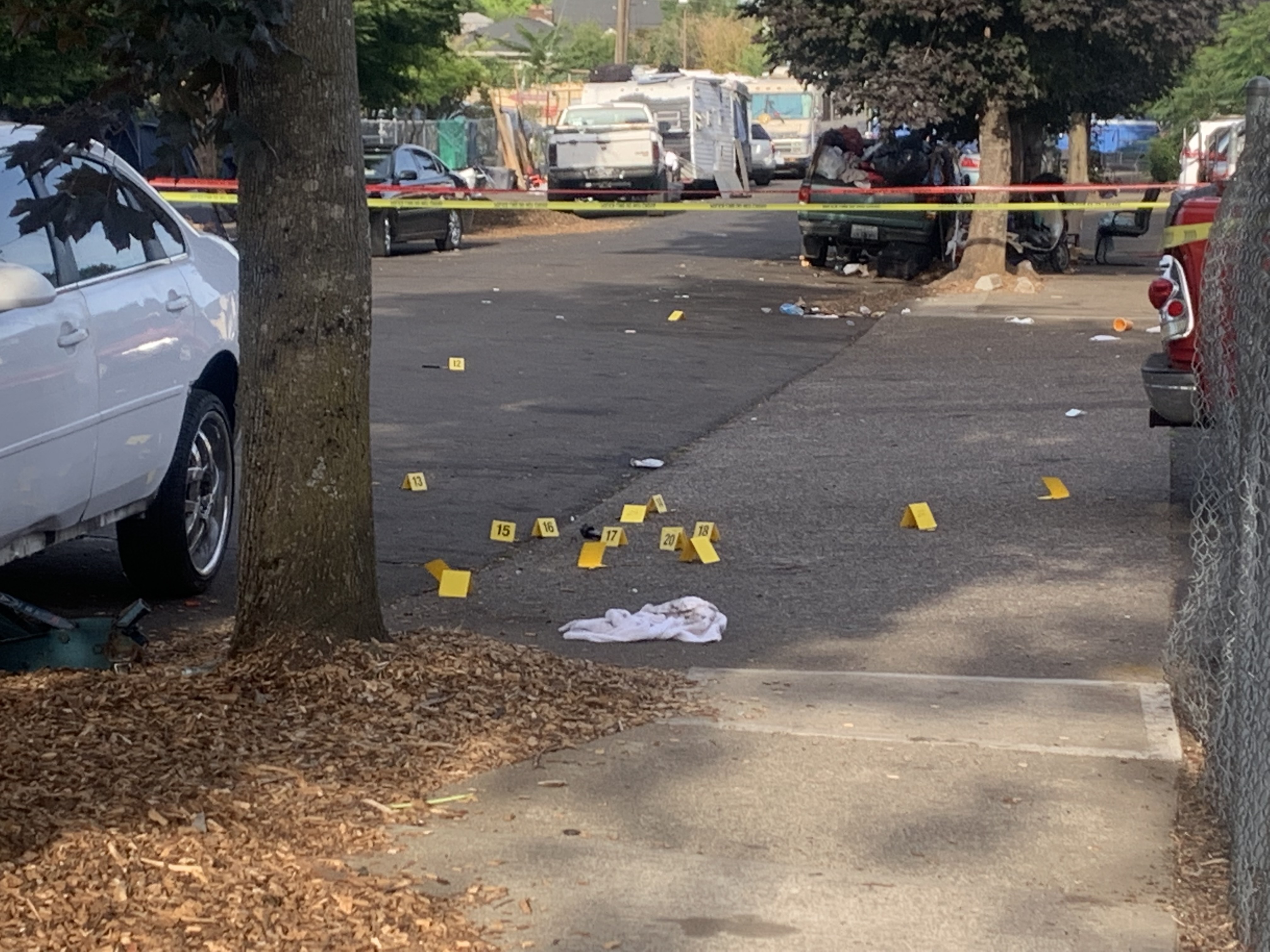
Numbers mark areas where law enforcement collected bullet casings and other evidence after an Aug. 10, 2021, shooting that left two people dead and four injured in Northeast Portland near the intersection of Fremont and 82nd Avenue.
Courtney Sherwood / OPB
Officials from multiple Multnomah County agencies announced several initiatives Thursday aimed at tackling what they describe as an unprecedented surge in gun violence.
“The old war on crime approach to public safety, which leans almost exclusively on law enforcement, prosecution and punishment is both ineffective and causes profound long term harm especially on communities of color,” County Chair Deborah Kafoury said at a press conference announcing the county’s plans.
The county Department of Public Health is getting involved in countywide gun violence reduction efforts as leaders seek to expand the breadth of resources available. The county is spending $2.8 million on public and behavioral health resources aimed at addressing root causes of violence.
Among the programs that money will fund is a seven-person behavioral health gun violence response team. The team will be a combination of mental health clinicians and people with lived experience. It will be made up of members from the Latino, African immigrant and Black communities. Department of Health director Ebony Clark said research has shown when services are culturally specific, they see increased engagement and improved outcomes.
“We’re not only working to prevent gun violence but we’re also working to address the issues of trauma from a generational and survivor’s perspective,” Clark said. “We’re working to address the impact and the challenges and the barriers that individuals who touch the criminal justice system experience.”
The mobile teams will take referrals and respond to various situations including providing support at gun violence scenes, responding to a hospital if a victim needs help, or a family member could call and request support.
“We imagine referrals will come from hospitals, from law enforcement; it will come from the behavioral health division, and it will come from the community,” Clark said. “[They’re] looking to address any issues specific to mental health and/or substance use.”
The announcement comes as Portland city officials have struggled to address a gun violence and homicide rate that has been steadily increasing for more than two years. So far this year, Portland police have logged 917 shootings and 66 homicides. Earlier this week, Portland police responded to seven shootings in a 15-hour window.
Multnomah County Sheriff Mike Reese said his agency had counted 30 shootings in the areas his deputies patrol including Maywood Park, Troutdale, Wood Village, Fairview and the unincorporated portions of the county. Reese said his deputies had confiscated 719 firearms so far this year, including several machine guns. The annual haul is nearly a three-fold increase over 2019 when deputies seized 267 firearms.
“By removing firearms from the equation, we reduce the likelihood of a lethal outcome, and keep guns out of the hands of those who pose the greatest risk,” Reese said.
District Attorney Mike Schmidt announced his office would be hiring two investigators and four prosecutors to assist with an unprecedented surge in violent crime. Schmidt’s office has prosecuted 285 gun related cases so far in 2021, up from 152 in 2020 and 51 in 2019.
Although Schmidt’s office is expected to receive $1 million to hire those new prosecutors, he stressed that the criminal justice system is not the primary solution to address gun violence.
“Locking people up and throwing away the key... is a failed experiment,” he said. “We will not prosecute our way out of this violence alone.”
The county is also pulling ideas from Operation Ceasefire, a gun violence reduction program pioneered in Boston and adapted in cities like Oakland, and Stockton, California. The county Department of Community Justice, which oversees parole and probation services, will start doing call-ins to people perceived to be the most likely to participate in gun violence.
The call-ins are a chance for representatives of the criminal justice system to explain the consequences for an individual if they engage in violence, but also make any needed resources and services available, such as employment help, mental health care or connections with a faith based community.
“It’s a lever that we pull when we see increases of gun violence in the community,” DCJ director Erika Preuitt said in an interview with OPB. Preuitt explained it’s a lever they use relatively infrequently, about 10 times over the past decade.
Preuitt said they reach out to people who are on supervision who they believe are actively engaged in gang activity.
“The goal is... they take the message and our hope is they will give it to the rest of the group, the people who are not on supervision,” she said. “So it has an exponential impact.”
County officials demurred when asked when the community can expect to see these initiatives start to drive down gun violence. Factors impacting violent crime rates are hotly debated among researchers and experts. Even the most lauded programs deployed to address gun violence have seen checkered success. Operation Ceasefire is credited with dramatic gun violence reductions in a number of cities, but a close examination of the data show short term drops usually disappear after a few years.
“We are in uncharted territory and we are constantly evaluating what we are doing and trying to pivot,” Kafoury said.


